The aim of this guide is to provide you the necessary steps and tips to help you keep your employees/contractors for longer.
Finding the right people with the right skills is among the top goals of every business owner. But it is keeping them for long-term that poses a lot of challenges because outsourced employees such as freelancers have more options these days.
This is true especially for freelancers because they have the opportunity to work with different clients and enjoy flexible schedules. But this should also be a good opportunity for eCommerce business owners since there are plenty of talented individuals out there who are looking for work.
It can be very daunting for any business owner to see his employees go because of greener pastures. However, it is NOT always about the money that makes people leave their jobs.
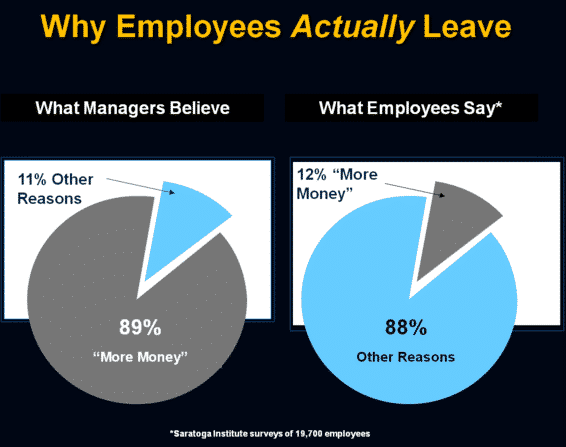
According to this Saratoga Institute survey, only 12% of 19,700 employees say that they leave their old jobs for more money.
You need to know this guide because it is not enough that you have the budget to pay for salaries. It is a good start if you have your finances in place, but it is also essential that you have the ideal working environment and relationship with your employees.
If this is your first time to hire freelancers, there are challenges you need to face especially when it comes to employee job satisfaction and loyalty. As mentioned earlier, it is sometimes hard to keep freelancers working for you for a long time because they can easily leave and find new jobs.
The following are the steps you need to take, whether you are a tenured eCommerce employer or a new one, in order to help keep your employees for a long time:
Step 1: Take A Look The Way You Recruit New Staff
Review your method/s for sourcing skilled individuals and the information you provide about your business. Ensure that your new hires understand your business, values, and mission even before they start working.
Step 2: Make Sure To Include Your Staff During New Hire Orientation
Doing so is an effective way of making everyone understand their significance and purpose in your business. It also aligns everyone’s tasks and goals as you update your business goals and plans for the future.
This also makes it clear to your employees that they are part of your long-term plans. So, don’t leave anyone out and ensure that they understand their specific roles.
Step 3: Establish Regular Communication
Staying in touch through communication channels makes it easier for remote teams to touch base with each other. However, regular communication is necessary if this is the type of setup that you have with your team of freelancers.
Communication also means having regular conversations or discussions not just about your eCommerce business or the products you sell online. It is also about giving and receiving feedbacks on tasks; as well as talking about goals, improvements and future projects.
Step 4: Create A Positive Work Environment
Basically, for an eCommerce business, the workforce is not as big as corporations. Take this opportunity to get to know your employees by creating a friendly and positive environment.
Unlike huge corporations, your business offers more flexibility and opportunity for employees to contribute their ideas and get rewarded for good results. Make it a welcoming work environment by giving them the floor for their ideas and plans especially if you value team effort.
Step 5: Provide Sufficient Work
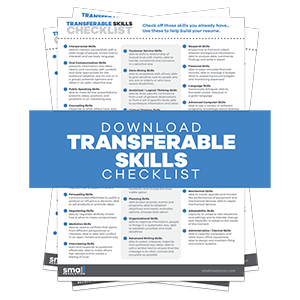
Let’s be honest, when a business owner doesn’t offer enough work to his employees, they will think there’s something wrong.
It’s a triggering element and this makes them think that it’s time for plan B.
You don’t want your employees to think of plan B (a.k.a. go for greener pasture) especially if you cannot afford to lose the best people.
By providing them with consistent work, it is unlikely that they will think it’s time to go.
Step 6: Create Incentives And Rewards Systems
Make it a point to thank your employees regularly for a job well-done. If you have been hitting your sales goals consistently, it is best to create financial incentives for everyone to share.
Your employees may not tell you that they want money or anything for the job they’re doing. It is a good surprise to initiate the gesture and give them something they can spend for whatever they need at the moment.
Other incentives may be in the form of freebies such as free lunch, coffee, show tickets, or a beach outing if you have the budget for it.
A rewards system can be a mainstay especially if you have exceptional employees who are dedicated to bringing in more profit for your eCommerce store. These people could be in your customer service staff or marketing specialists or anyone who has shown exemplary performance.
You can give incentives when you hit a certain sales target for the quarter, for example. You may also create a profit-sharing program as an alternative.
Rewards can be given away in various forms (i.e. paid day-off, gift certificate, gift cheque for shopping, etc.) and usually these are for exceptional individuals.
Learn From Others
We believe that it is best for you to see for yourself real employee opinions about their jobs and what made them stay (or leave). These are people who work for different companies, so these are opinions across the board.
In order for us to provide real insights, we asked a few people, who work online and offline, to give us their honest answers to this question…
“Outside of compensation, what keeps you staying with your employer?”
(source: Chron Blog)
Jen (works in an international Research and Development company, UK): The way employers treat employees is a huge factor to stay in a company. There are also good benefits, but commitment on the team/company’s mission and vision is the core driver to keep employees loyal and satisfied. A bonus for long-time employees is if there’s a retirement package, and our company is working hard on that one.
Kate (works in an HR company, Canada): Staying with an employer for more than 5 years is rare for me [laughs] because I usually leave after 2-3 years especially when I don’t see growth in my career. My current employer recognizes this issue and he makes sure that we work not just because we need to profit, but because there’s trust and accountability. He’s accountable for clients and his team, and we are also accountable and responsible for making things happen as a team. Benefits and salary are secondary to the type of working relationship and camaraderie that we have.
Lena (used to work for an Australian web company, the company let go of half of its contractors and she’s included): I stayed in my previous job because I liked what I do and I like my teammates. I was a marketing writer for more than 2 years and there were ups and downs in the company; but the team I belonged made me feel that my work is vital.
Nellie (works as a freelance writer and editor): Since I work full-time as a freelancer, I’d say that it’s the communication between me and my clients that really keeps us working together for a long time. Good communication means having to discuss assignments and being open to feedbacks, and it also establishes mutual trust because we live continents away from each other. Some clients, whenever they receive the assignments before or on the day of the set deadlines, they provide a little bonus on the side. They’ll tell me it’s a little token of appreciation for helping them complete their projects on time, if not earlier.
Mich (works as a freelance writer): I stayed with a couple of online clients for more than 2 years writing full-time. I stayed because I felt that what I was doing was significant and they were able to show me that by providing more assignments and basically showing me that they trust me. There were occasional bonuses for certain tasks that seemed impossible to achieve at the time. Those gestures from my clients were important because it made me feel important and part of an awesome team.
Matt (works for an Australian media company for 4 years): I stayed for a long time here in my current job because the CEO is very personable. What usually motivates me to work and stay in a company is how the managers or the owners treat their people. I’ve left companies that are slave-drivers; they’re not worth it.
We also found these good answers to one of the similar questions posted on Quora:

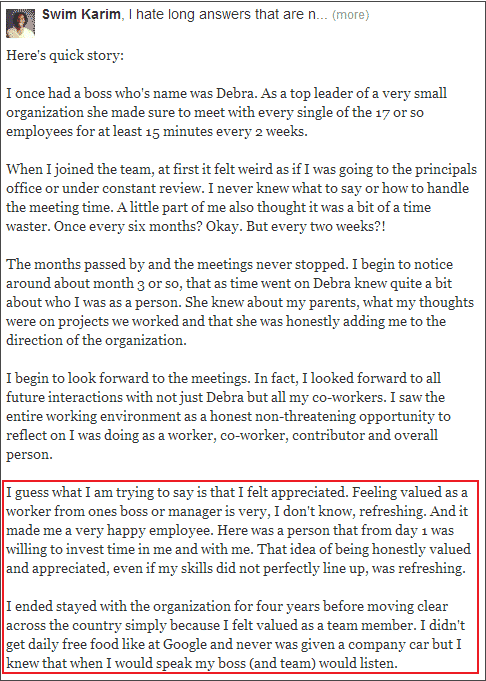
The following are real opinions on Quora from people who have worked in HR or have handled staff in a company:
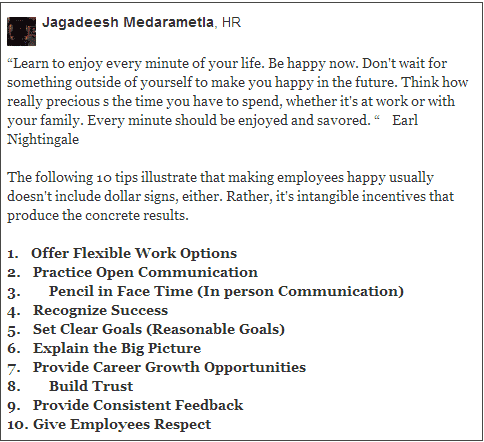
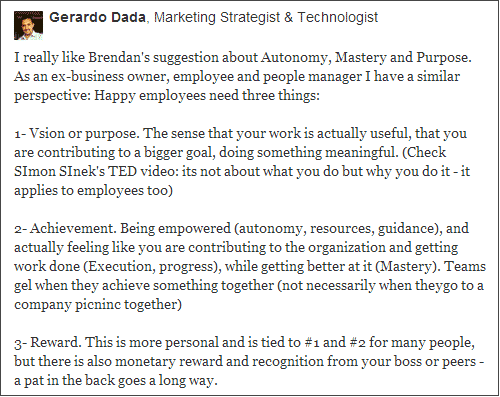
Final Checklist
As an eCommerce business owner who manages a team of employees, you have a huge responsibility of making your employees motivated and satisfied with their work.
It takes more than just money to keep them working with you because at the end of the day, they are still people who can get frustrated, stressed, and tired after work.
While real accounts of employees and business people/HR have been presented on this guide, it is your discretion if you’ll take these accounts and use them as references.
Always remember that your business is unique, so you need to have a unique approach rather than just copying what others have said.
- Review your recruitment style and see if the people you are hiring are familiar with your business.
- Include your staff during new hire orientation to make everyone understand their significance in your business.
- Make it clear to your employees that they are part of your long-term plans.
- Always touch base with your employees to get to know them a bit and if they are facing any work-related challenges.
- Be on top of things, but minimize micromanaging.
- Create positive work environment – whether offline or online.
- Hear your employees‘ suggestions, ideas, insights, and feedbacks.
- Provide sufficient work to your employees.
- Create and provide incentives, profit sharing programs, and/or rewards systems for a job well-done.

